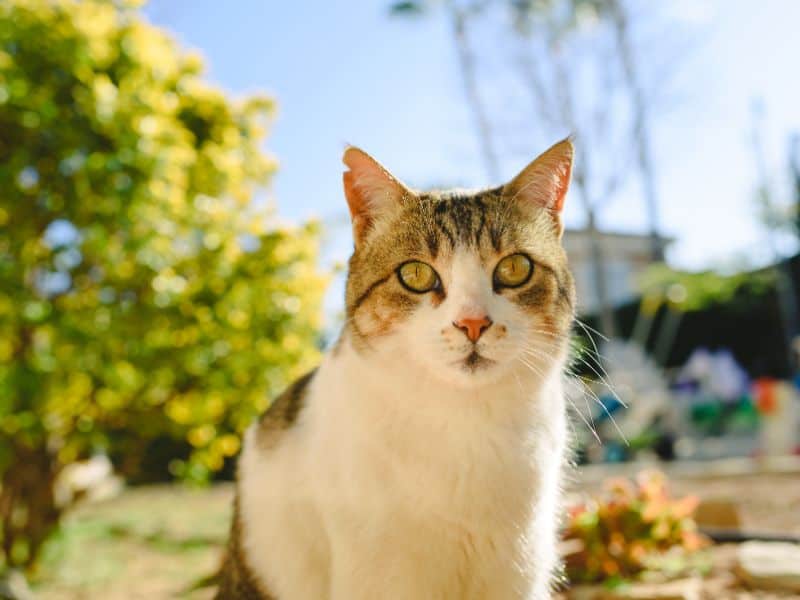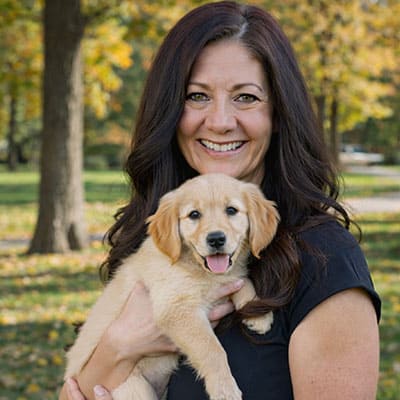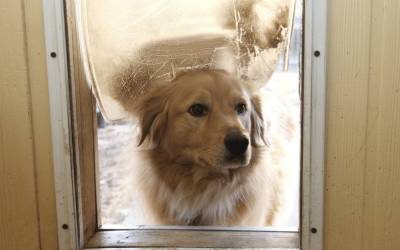I recently saw a post in a Facebook group called Yorktown 411 about community cats. The OP posted the following: “We have cats that roam all over from who knows where (we think we know). We have bird feeders out around the house so we can watch the birds, but I am getting so tired of finding piles of feathers… Animal control does nothing.” This post inspired me to dig into community cats and the importance of TNR in Yorktown. As a bird lover myself, I understand the concerns and believe that we can find a healthy balance between community cats and bird populations in the Peninsula area. Here’s Yortown 411: Community Cats & TNR.
What is a Community Cat?
A community cat is an unowned, free-roaming cat that lives outdoors and can be friendly or feral, adult or kitten, healthy or sick. Often referred to as stray or feral cats, the term “community cat” is preferred because it’s a more inclusive umbrella definition that recognizes these cats as part of the local ecosystem.
Community cats often have caretakers who provide food and basic care but are not legally considered owners. They are generally not suitable for traditional adoption or for living indoors. Instead, community cats have adapted to living outdoors – usually in colonies – and can thrive in their environment when properly managed through humane approaches like Trap-Neuter-Return (TNR) programs.
How Do Community Cats Affect Bird Populations?
Community cats have a significant impact on wild bird populations, though the effects are complex. It is estimated that free-ranging domestic cats kill billions of birds and mammals annually in the United States, with unowned cats causing most of this mortality. For birds, cats are considered the number-one direct, human-caused threat in the U.S. and Canada, killing approximately 2.4 billion birds every year.
However, it’s important to note that cats tend to prey on weaker or less healthy birds, potentially having a less severe impact on overall bird populations than many believe.
How Do Community Cats Affect Rodent Populations?
Regarding rodents, the relationship is less straightforward. In some cases, removing feral cats from an area could potentially lead to an increase in rat abundance, as cats may provide some top-down control of rat populations. Cats tend to do better at rodent control in rural and suburban areas than they do in high populated urban areas because of the sheer number of rats in dense cities.
What is a Bird Lover to Do?
I, too, have bird feeders outside my home and very much enjoy watching birds. You can read about my frequent adventures at our local Wild Birds Unlimited store here.
I don’t, however, have cats that kill the birds in my yard. That said, we sometimes find feathers like the OP mentioned in their post on Yorktown 411. I find that the culprit in these cases is raptor birds of prey, not cats. I often notice that the morning doves are the ones that are attacked, and I’ll see feathers in a circle with a space in the middle. That’s how I know it was a bird of prey that got them. They will strip the bird’s feathers before eating them. From my understanding, cats and foxes eat the feathers or at least bite them. Here’s an interesting discussion on this issue.
Yorktown 411: Community Cats & TNR
While I don’t usually engage in the discussion on Facebook – both because I often arrive too late to add value or miss them – this conversation inspired this blog for various reasons. I believe there is a great solution for the cats and the birds – TNR.
As mentioned above, TNR is a humane approach to controlling community cat populations. The way TNR works is that an individual will trap (T) and then take the animal to the local shelter or a veterinarian with a TNR program to have them spayed or neutered (N,) and finally return them when they have recovered from their sterilization.
TNR isn’t just about ensuring that cats don’t reproduce at alarming rates – an unspayed female cat can have 100+ kittens in her lifetime – it’s also a great way to vaccinate these animals against rabies and other highly contagious illnesses. Think about the implications of a cycle in which 100+ kittens roam, have hundreds of kitty litters themselves, and have the ability to spread disease. It’s terrifying to think about because, unless we do something, this cycle doesn’t end.

Communities Cats & TNR Programs in Hampton Roads
Alley Cat Allies, a national organization dedicated to educating and advocating on behalf of community cats, is a great resource for those looking to help control cat populations – and, in turn, bird populations – in their areas. Here, you can find a database where you can access information based on your location.
Peninsula Regional Animal Shelter
Peninsula Regional Animal Shelter provides the following information for Free-Roaming Cat Assistance: The Animal Welfare Division (AWD) provides assistance with free-roaming cats and offers humane traps to Newport News citizens. Feeding free-roaming cats is prohibited by City Code without a Free-Roaming Cat Colony Permit. For information on trap rentals or colony permits, contact the AWD at 757-595-7387.
The Cat Corner, Inc.
The Cat Corner, Inc. is a non-profit no-kill cat shelter based in Hampton, and dedicated to Hampton Roads cats – adoptable and community cats alike. Here, they offer tips and guidance on addressing feral cats in the area. If you’re interested in managing a colony, they offer guidance on that too!
Cat Care in Yorktown, Poquoson, Hampton, and Newport News
As a professional cat sitter and devoted animal lover, I like that this recent post got people talking about how to help both cats and birds in the Peninsula area. If we don’t discuss these important topics, our community is put at risk of preventable diseases and can’t respond to the needs of our wildlife and community cats. While not everyone in the comments of the above-referenced post agreed on a way forward, my opinion is that prioritizing TNR today can set us up for a better world for the entire community tomorrow!
Hearts at Home Pet Sitting offers dog walking and cat sitting services in Yorktown, Poquoson, Hampton, and Newport News. To register your pet(s) or home with us, please complete a new client questionnaire here. Existing clients may request services here. Those outside our service area are encouraged to find a pet sitter near you at the Pet Sitters International or National Association of Professional Pet Sitters websites.
Please visit our website or contact us by email at Hello@HeartsAtHomePetSitting.com or by phone at 757-745-9868 to learn more. We look forward to growing with you and your family in 2025!





0 Comments